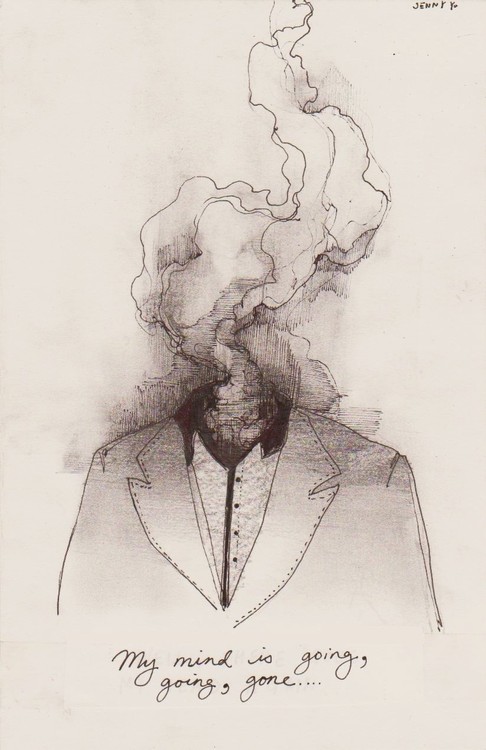http://www.youtube.com/watch?v=ZD7U7cQXVQQ
How do you measure the success of a Shakespeare in Performance play? For me, the standard is this: by the end of the play, when the cast breaks into their final, triumphant song, you will want to smile and laugh and get up and cheer but by that point the muscles in your face will be aching and twitchy from having laughed for three solid hours. You’ll try and give the cast your best, most sincere and hearty big-toothed smile, but you’ll only manage a little wobbly grimace that looks nothing but painful.
So you’ll swallow your embarrassment and immediately head for Trader Joe’s (because there is no place better to soothe post-social anxiety), but the whole time you’re there an gnawing uneasiness will take hold of you. You’ll wander through the produce section, ostensibly searching for garlic but really wondering why that kid messed up Claudio’s character so much. You’ve always loved Claudio. He’s so adorably eager, so dashing, so sweet, so innocent…but this kid made you want to punch Claudio in his stupid face. With brass knuckles.
“What was it?” you’ll ask yourself aloud, alarming the local octogenarians, who proceed to give you a mercifully wide berth. “Why did I feel like feeding Claudio and the Prince to the feminists after that play? I’ve never felt like that before. Usually I sort of feel sorry for them and want to make them cookies. But this time, I wanted to sic Kassie and Clare on them with strict instructions to eat the marrow too.”
It will trouble you. So much so that you will ignore your strict diet and buy cookies and absently eat three on the way home, and then spend half an hour bitterly cursing that damned Claudio and that double-damned Prince, because you wouldn’t have eaten three cookies if they hadn’t been such complete jackasses. But seriously, who sits there and laughs when they find out their one-time fiance is dead as a frickin’ doornail because they accused her of being a big old slut?
And then. And then, the heavens will part. And revelation shall spring forth.*
But seriously, in the word of Ted,
http://www.youtube.com/watch?v=OT4B-NJUcZEYeah, here’s the thing. That’s the whole point.
What it all comes down to, really, is the friar.**
Here’s what I thought of the friar: “Ohhhh, what a wise and wonderful priest. Seriously, he’s brilliant. He’s like my favorite priest. He can see people’s souls and understand their motivations and put their feet gently on the right path while miraculously keeping utter desecration and misery at bay. Look at that face. I swear, if I ever see that kid on campus, I’m going to pull him aside for confession. I don’t care if he’s not really a priest. He should be. Just look at him!”
Here’s what I never realized before: the friar is totally wrong and his plan fails utterly, because he’s basically just grasping at straws to keep everything around him from going to hell.
Seriously, what kind of advice is “hey, here’s an idea! Let’s pretend she’s dead.” Really? That’s not a cleverly constructed, carefully thought-out plan. That’s the kind of advice you’d shout at someone in a panic to get them to stop telling their daughter they want her to die. It’s not a good plan at all, it’s just the only thing Friar Francis could think of at the moment. And it failed completely, because Claudio and the Prince didn’t even blink when they found out she was dead. One of the things the play exposes is the “boy’s club” mentality” of Claudio, Don Pedro, and Benedick, a mentality that contributed to their vengeful shaming of Hero and grotesque indifference to her death. It’s a mentality that only Benedick really learns to overcome. In the end, Benedick is the only character who is not static, who allows the good and bad events of the play to shape him for the better. Unlike the Prince and Claudio, he does not partake in the gleeful slander at the wedding, despite his admittedly closer ties to the Prince than to Beatrice at that point in the play. Claudio and Don Pedro, on the other hand, are vicious in their slander, and absolutely indifferent to Hero’s agony.
Worse yet, they remained impassive to her fate in the face of Innogen and Leonato’s parental wrath.
In a stroke of brilliance, Dr. Curtright replaced Antonio with Innogen, She’s a ghost character in some manuscripts, and it was definitely taking a bit of license to give her Antonio’s lines, but I think it was a masterful decision. It gave an entirely new dimension to the grief and fury that Hero’s family suffered. Hearing these words from Hero’s mother,
“Content yourself. God knows I loved my daughter;
And she is dead, slander’d to death by villains,
That dare as well answer a man indeed
As I dare take a serpent by the tongue:
Boys, apes, braggarts, Jacks, milksops!”(Much Ado About Nothing, Act VI, Scene i)
was terrifying. The actress who played Innogen was devastating in the role. I don’t think I’ll ever forget the look in her eyes when she delivered those lines to Claudio. She had this truly frightening glint in them, the kind would make a man’s blood run cold. It made my blood run cold. There was no doubt in my mind that she could have taken a sword out and run Claudio through. Yet she remained dreadfully composed at the same time.
Here’s the thing about Much Ado About Nothing: at it’s center, there really is a horrible tragedy. Hero’s aborted wedding is one of the most painful scenes I’ve ever read or seen performed, and too often it isn’t played as such. Too often the directors and the cast get caught up in the merriment of the play and pass over this scene lightly, which, in my mind, destroys the meaning of the play.
I went into the play with a lot riding on that scene, and the later scene when Hero’s parents encounter the Prince and Claudio. It requires so much from the actors who play Leonato and Antonio, or in this case, Leonato and Innogen. Particularly Leonato, though. It’s imperative that the actor be able to rage without any hint of histrionics. He has to be awfully, terribly angry, but the actor also has to possess enough skill to do justice to the complexities and nuances of anger. It can’t just be bluster, or the play is ruined.
Once again, I was shocked by how much better this college student played Leonato than any actor I have ever seen. He was Leonato. For the rest of my life, when I read this play, Leonato will live in my imagination in the figure and form of a college student in his early twenties. He put Kenneth Branagh’s Leonato to shame. There was a subtlety of expression and a depth of emotion in him, and in Innogen, that I have yet to see in those characters elsewhere.
Last night I was talking with the director, Dr. Curtright. The class that does these plays, Shakespeare in Performance,is his brainchild. He’s a Shakespeare scholar who has written countless papers and a book on the bard. And yet he said, “Every time I stage a play, I learn something new about it.”
I think this is why these plays at Ave are stunning their audiences. These kids are NOT primarily actors. They are primarily students. They study the text, learn the language, immerse themselves in Shakespeare, live it, breathe it, and then act it. They, like Dr. Curtright, don’t come to the play with an idea of how they want to play their characters; they come to the play and let it tell them about the characters.
This approach gives new life to Shakespeare, because it allows the plays to be experienced as they were written, instead of being suffocated under another tired, artificially-imposed “interpretation.” It shows the audience something that has been long known but too often forgotten: Shakespeare is brilliant. He is able to layer meaning and complexity inside a comedy that it both side-splittingly hilarious and unspeakably tragic. He is able to write a play about “nothing” that nevertheless reveals fundamental truths human nature.
Lucky for me, I get to see the play again next weekend. I was going to be mature and responsible and wait until I had seen it twice before blogging about it, but I was too excited. So these are just first impressions. I’ll be back next week with So You Think You Understand Shakespeare? Part II. (Spoiler alert: you don’t***.)
*It’s probably important to note for the sake of honesty or whatever that revelation only happened after a bottle of wine and a long conversation with the Shakespeare scholar that lives next door to me. Who happens to be the director of the play, the mind behind Shakespeare in Performance, and one of the most hilarious-yet-terrifyingly-brilliant people I’ve ever known. (Geek alert! He also wrote a book about Sir Thomas More! Geek out, little Catholic geeks.)
**It’s also important to note that the Ogre made me put these footnotes in because I was totally going to take credit for this revelation myself, because this argument: “THAT’S WHAT A BLOGGER DOES, DUDE, I IMPROVE THE TRUTH” didn’t get very far with him. He was all, “something something intellectual plagiarism something something GRRRRR PLAGIARISM.” See why I call him the Ogre?
***Obviously this statement does not apply to my father-in-law, the Ogre, Dr. Curtright, Sam Rocha, or any of the various academic types who might occasionally read this blog for a laugh and a reminder of how far they have to go on that “teaching simple grammar and basic sentence structure” front. Don’t yell at me.











